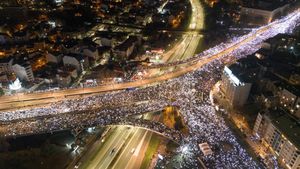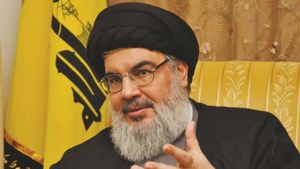The University of Michigan has come under fire after suspending its pro-Palestinian student group, Students Allied for Freedom and Equality (SAFE), for two years. The decision also involves revoking the group’s funding, following accusations of violating the university’s standards of conduct during protests demanding divestment from companies associated with Israel.
SAFE was targeted for actions including a spring protest outside the home of one of the university’s regents, as well as unauthorized demonstrations on campus grounds. The university stated, "Protests are welcome at U-M, so long as those protests do not infringe on the rights of others, significantly disrupt university events or operations, violate policies or threaten the safety of the community.”
The suspension reflects the growing tensions surrounding the Israel-Hamas war, which reignited after Hamas militants attacked Israel on October 7, 2023, killing approximately 1,200 individuals. This incident was the catalyst for heightened activism across U.S. campuses, where pro-Palestinian demonstrations have surged, resulting in around 3,200 arrests nationwide. The university’s decision came on January 16, 2024, and SAFE was told it cannot reserve university spaces during its suspension.
President Donald Trump recently signed an executive order targeting antisemitism on college campuses, promising serious repercussions for alleged offenders. This directive has fueled concerns among activists about the stifling of their voices. SAFE responded emphatically, asserting, "The move by the university was an attempt to erase Palestine from our campus.” They emphasized their intent to continue advocating for Palestinian rights, regardless of the suspension.
The backdrop to this situation is fraught with emotional and contentious issues. Following public protests, including tents set up outside the regent’s residence and confrontations with police, tensions have escalated between pro-Palestinian groups and university officials. SAFE, part of the larger National Students for Justice in Palestine coalition, has expressed strong discontent with the characterization of its actions as unlawful or violent.
Just last spring, members of SAFE conducted a demonstration at the home of regent Sarah Hubbard, which involved setting up tents and placing faux bloody corpses to draw attention to their cause. Hubbard denounced the protest as disruptive, describing how participants chanted and made noise early in the morning, leading to police intervention. No arrests were made, but subsequent protests resulted in charges against several other demonstrators for trespassing and resisting police.
Activists involved have consistently called for their universities to sever any ties with organizations and companies facilitating military action against Palestinians, drawing ire from conservative factions. Critics claim the actions of institutions, like the University of Michigan, are emblematic of broader efforts to suppress pro-Palestinian sentiment and discourse on campuses across the nation.
On social media, activists have rallied support, citing the university's punitive measures as detrimental to free speech. They argue it attempts to silence valid political expression concerning humanitarian issues. The sweeping tide of demonstrations, against what many label as genocide against Palestinians, has put university administrations under intense scrutiny, leading them to grapple with complex issues of protest rights and community safety.
The University of Michigan has stipulated conditions under which SAFE could potentially have its sanctions reviewed and lifted before the two-year maximum. This would require the group to comply with university directives and engage transparently with school officials, with any adjustments not expected until at least winter 2026.
Supporters of SAFE argue the university's actions reflect nationwide trends where students advocating for Palestinian rights face increasing hostility and repression under various guises. They insist the intersection of activism with institutional accountability is becoming perilous, with many opposing voices being labeled as radical simply for standing against perceived injustices.
The dilemma at the University of Michigan poses challenging questions about the balance between lawful protest, institutional policies, and the rights of student organizations to express politically charged messages. Observers will watch carefully how this case develops, particularly within the broader scope of campus dialogue on global issues of human rights.



